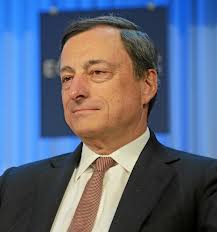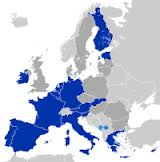With unemployment at 11.8%, GDP growth barely positive, inflation at a microscopic 0.7% and the ECB balance sheet a trillion euro smaller than it was in 7/12, Mario Draghi will finally engage in stimulative monetary policy. While buying sovereign bonds won’t happen, negative interest rates, purchases of bank loans and long-term loans to banks at low rates are likely. These steps will, at minimum, weaken the euro and boost exports.
Tag Archives: ECB
Daring Draghi
With Eurozone inflation below 1% and falling, and the money supply barely growing, the European Central Bank may have to become very creative to stave off deflation. Here’s why: while it might have authority to buy sovereign bonds, due to political considerations it would have to slavishly buy them in proportion to the economic weight of each country in the Eurozone rather than focus their purchases where deflation already exists.
Euro Risk
Despite the euro zone being in recession, the euro is dramatically rising against the US dollar, from $1.20/euro in July to $1.36 today. Why, because massive European Central Bank (ECB) action prevented Spain from collapsing, and the ECB is fast becoming an inflation hawk and has thus started to shrink its balance sheet, until, of course, the southern European countries go into recession and the ECB again loosens monetary policy.
Pain in Spain
In an effort to avoid a sovereign bailout and curry favor with the ECB, Spain will cut spending by $51 billion in ’13, almost 3% of GDP! Amazingly, this belt tightening is occurring during a recession! As a result, the contraction will worsen causing Spain to dramatically overshoot its deficit target of 4.5% of GDP in ’13, which is why they cut the budget in the first place! Go figure.
Daring Draghi
Last week the ECB, finally, agreed to make unlimited purchases of Spanish and Italian short-term bonds if the countries ask for help and agree to make “changes” to their economies. While this will buy time for politicians, it does nothing to solve the deep structural problems including the persistently low productivity of the Southern European countries that has been exacerbated by joining the eurozone. This saga ain’t over.
Monetary Medicine
Things can’t possibly be good when yesterday, in less than an hour, the ECB, The Bank of China, and The Bank of England all offered monetary medicine to the weakening global economy. Problem is, easier monetary policy won’t help much. What’s needed is stimulative fiscal policy. Separately, while US labor market conditions are worse than in Q1, they’re not terrible. Tomorrow’s employment report will show less than 125,000 new jobs.
Bank Run 101
Bank Run 101: Spaniards withdraw euros from Spanish banks and deposit them in German banks. Since Spanish banks still have the same loans outstanding, they go to the Spanish Central Bank for loans. Since all Spanish banks need money, the SCB borrows from the ECB which then borrows from the Bundesbank — because German banks are flush with Spanish deposits — to lend to the SCB which lends to Spanish banks.
Zombie Banks
Spanish bond yields are up again as the short term benefits of the ECBs massive, easy-money lending program (LTRO) dissipate, and the reality of a recession in Euroland sets in. Making things worse, some European banks used the cheap 1% LTRO money to buy lots of Spanish sovereign debt yielding 5%. As a result, if Spain falters, it will lead to lots of zombie banks that lend stupidly.
Next Time it’ll Hurt More
Hard as it was, the recent Greek default was easy because Greece just stiffed private banks and hedge funds. Next time – yes, next time – it will be harder. This is because most of Greece’s debt is now held by the IMF, the ECB and many European nations who lent directly, or via the bailout fund, to Greece. So, Greece’s creditors are now, generally, tax payers of neighboring states!
Money for Nothing
In Europe, Mario Draghi, the head of the ECB, is flooding banks with a $1 trillion euros ($1.3 trillion) at 1% in an effort to recapitalize them and maintain liquidity. Many banks are using this money to buy sovereign debt that pays high rates of interest. Unfortunately, as was the case here with QE1 and QE2, the banks are not lending the money, resulting in a more severe European recession.







